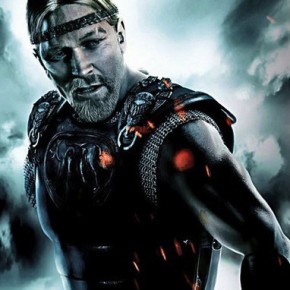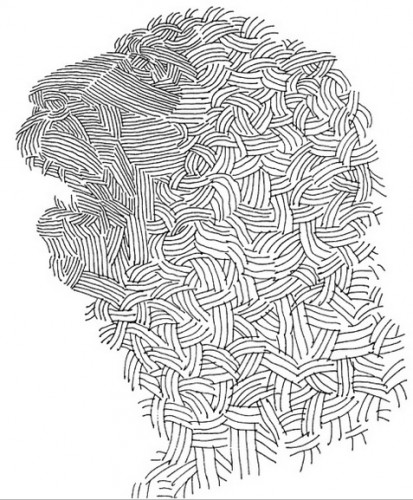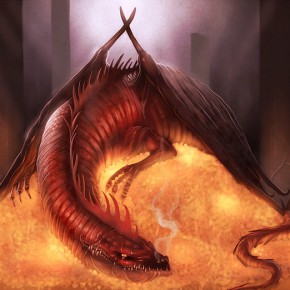
Stars, spattered out through lifeless night from end to end, like jewels scattered in a dead king’s grave, tease, torment my wits toward meaningful patterns that do not exist.
-From John Gardner’s Grendel
When I first picked up John Gardner’s novel Grendel, I expected a quirky, fun read; something along the lines of Gregory Maguire’s bestseller turned Broadway hit Wicked that creatively reimagines the Wizard of Oz. What I got was something starkly different. This is not to say Grendel isn’t frequently funny, it certainly is. And like Wicked, Grendel is told from the antagonist’s perspective, by the monster of Beowulf’s heroic epic. But Grendel’s comedy is a dark humor laced with philosophical, historical, and anthropological discussion. As the novel progresses, its main character grows more jaded and frustrated, his worldview bleaker. What starts as a whimsical, tongue-in-cheek retelling of the Anglo-Saxon poem grows into an exploration of existentialist and nihilist thinking. A recurring juxtaposition is that of the brutish violence and futility of the unthinking animal kingdom with that of human civilization, a comparison that Grendel, the ultimate outsider, can make objectively. As time goes on, Grendel begins to see even human systems of meaning, (mythology, early religion, government, moral codes of honor) ‘meaningful patterns that do not exist,’ as equally perishable and futile as the rest of the cold, unthinking universe. Thus, Gardner’s novel shows us through fiction what a world lacking the underpinnings of the redemptive love and value provided by the gospels looks like. It is not pretty.
In the original Beowulf, the narrator of the 8th century Anglo-Saxon epic depicts Grendel as almost the embodiment of fear, evil, and otherness. Though descendent of Cain and vaguely humanoid despite his grotesque appearance and monstrous appetites, he is not exactly a well-rounded character. Rather, he serves as a foil to demonstrate Beowulf’s archetypal attributes of the Anglo-Saxon warrior-hero. Gardner’s Grendel, however, is an intelligent, misunderstood, and sympathetic character. Even at his most violent, Grendel’s motivations come across as touchingly human and familiar. We see his life roughly broken into a childhood, lonely but filled with discovery, adulthood, searching and frustrated, and the time from his war against Hrothgar and the Danes (characters from the original poem) to his death at the hands of Beowulf. In this last phase of life he has grown fatalistic, despondent, and callous.
Grendel narrates his life through a long frame-narrative flashback. His childhood is one full of lonely, yet exciting discovery of the world around him. He leaves his cave and his loving yet essentially unintelligent mother and explores the outside world. This joyful quest quickly turns to sad realization in an episode where his foot becomes caught in a tree between a bull and its calf. The bull charges, wounding Grendel, but is unable to reach anywhere besides the bottom of his leg. Despite that, the bull continues his mechanical, futile bashing of the tree, unlearning in his efforts. Grendel concludes:
I understand that the world was nothing: a mechanical chaos of casual, brute enmity on which we stupidly impose our hopes and fears. I understood that, finally and absolutely, I alone exist. All the rest, I saw, is merely what pushes me, or what I push against, blindly – as blindly as all that is not myself pushes back. I create the whole universe, blink by blink… Talking, talking. Spinning a web of words, pale walls of dreams, between myself and all I see.
This dive into solipsism and self-pity mixed with self-loathing becomes a central theme for much of the novel. While still stuck in the tree, Grendel has his first encounter with humans as well. Due to miscommunication, this interaction turns sour as well: “…and suddenly I knew I was dealing with no dull mechanical bull but with thinking creatures, pattern makers, the most dangerous things I’d ever met.” This sets the stage for one of the central tensions of the novel. Despite being ‘thinking creatures’ how truly different are human motivations from the impulses driving the unthinking creatures around them? How different is the essential nature of the king who stands victorious in battle versus the ram standing ‘stupidly triumphant,’ belligerent at the beginning of mating season? What is the importance of the words, the systems of thought, the belief systems we impose on the unthinking world around us: a sun that ‘… spins mindlessly overhead, the shadows [that] lengthen and shorten as if by plan.’
Grendel witnesses Hrothgar brutally build his empire (a back story largely omitted in the original poem). We see him conquer neighboring settlements and, instead of destroying them, demand of his vassals payment in tribute of treasure and fighting men. We see the linking, physically and economically, of these settlements with roads. Through entertaining prose, Gardner essentially gives an anthropology lesson on the movement from hunter-gatherer societies to feudal civilization. But Grendel’s observation of the development of man comes to drive his bloodlust. Watching the worldly success of others, “had a strange effect on me: it no longer filled me with doubt and distress, loneliness, shame. It enraged me. It was their confidence, maybe- their blissful, swinish ignorance, their bumptious self-satisfaction, and, worst of all, their hope.”
Two characters then tug at Grendel’s worldview: that of the Shaper, a story-teller of Danish mythology much like those who originally composed Beowulf, and the Dragon. The Shaper is able to impose to the order of words on a chaotic, seemingly random history. More importantly he tells a story that lays down the warrior-ethic code of honor and morality and establishes a tradition that gives life meaning and value for the pre-Christian civilization. The lack of description and personality of the Shaper as a character suggests he is meant to be seen as allegorical for poetry, art, and perhaps religion in general. However, a constant tension in Grendel develops from his natural attraction to the beauty and order in history described by the Shaper versus the messy violent origins of Hrothgar’s empire that Grendel knows to be true.
The Dragon, Grendel’s other great philosophical influence, is one of the most memorable characters of the novel. His appearance, glowing red, perched on mounds of gold, resembles Smaug of J.R.R. Tolkien’s The Hobbit but his jaded, effete mannerisms give him a comical, likeable side. His unsparingly rational diatribe provides a counterbalance to the Shaper, who the Dragon says “provides an illusion of reality- puts together all their facts with a gluey whine of connectedness.” The Dragon’s words haunt Grendel, clinging to him like a vague stench through the rest of the novel. The Dragon is a unique being, capable of seeing both forward and backward in time from beginning to end. Using laughably complicated language he attempts to explain to Grendel the ways of the world through barely paraphrased and incredibly dense allusions to Jean-Paul Sartre and Alfred North Whitehead’s Modes of Thought. Frustrated at Grendel’s lack of understanding, the Dragon finally summarizes that all worldly aspirations and human pretensions are ultimately pointless due to the ravages of time against the backdrop of the ultimate heat- death of the universe in which, as many modern physicists agree, all will end in “A sea of black oil and dead things. No wind. No light. Nothing stirring not even an ant, a spider. A silent universe. Such is the end of the flicker of time, the brief, hot fuse of events and ideas set off, accidentally, and snuffed out, accidentally, by man. Not a real ending of course, nor even a beginning. Mere ripple in Time’s stream.’ But Grendel struggles to let go of the beauty and context provided by the songs of the Shaper, even though he knows that much of this mythology omits or lies about the true brutal origins of the Dane’s empire. The Dragon’s cold rationality concludes that Grendel should give up on mankind or any higher purpose provided by the Shaper: “What god? Where? Life-force, you mean? The principle of process? God as the history of Chance?…A brief pulsation in the black hole of eternity.” In this landscape of futility, the Dragon’s fatalistic, absurdist advice follows Grendel: “My advice to you, my violent friend, is to seek out gold and sit on it.”
Just as the original Beowulf hints through its narration at an alternative to the brutal warrior-ethic of the Dark Ages (Beowulf originated in the pre-Christian Dark Ages of northern Europe but was recorded centuries later by Christian monks) an alternative world view is also hinted at the end of Grendel, if only through the strange, extreme, almost poetic taunts of Beowulf to the dying Grendel. Unlike the tradition/honor centric ideas of the Shaper, or those of the nihilistic Dragon, Beowulf begins to roughly outline a shift from the pagan world to that of Christian belief in salvation and resurrection:
As you see it it is, while the seeing lasts, dark nightmare-history, time-as-coffin; but where the water was rigid there will be fish, and men will survive on their flesh till spring. It’s coming, my brother. . . . Though you murder the world, transmogrify life into I and it, strong searching roots will crack your cave and rain will cleanse it: The world will burn green, sperm build again.
The novel concludes with characteristically black humor. Grendel, wounded, watched by the feeble minded animals he has come to despise, crawls away from Beowulf and toward a cliff. He turns toward the animals, and in the final lines of the story spits bitterly, “Poor Grendel’s had an accident,” I whisper.” So may you all.” Even in death we see Grendel’s belief in the accidental nature, the thoroughly unconnotative meaninglessness of the universe. One in which “seasons that never were meant to be observed,” pass without consequence. Through fiction, whit, and humor Gardner builds a universe in which one can find value in nothing. It is a disturbing example, hidden in readable, whimsical storytelling, of what alternative we have to a belief that God so loved the world, that he gave his only begotten Son, that whosoever believeth in him should not perish, but have everlasting life. That through Christ all things are possible, but without him, and without the love and salvation he embodies, much of life simply seems far less meaningful and fulfilling.

COMMENTS
Leave a Reply















